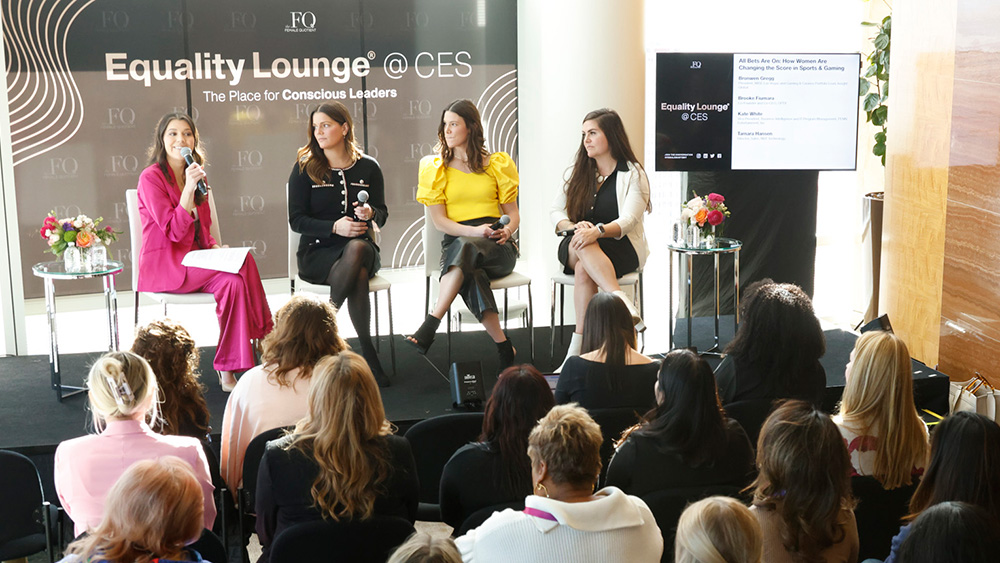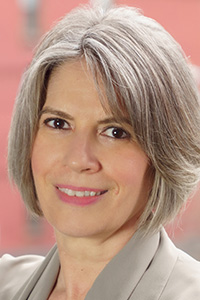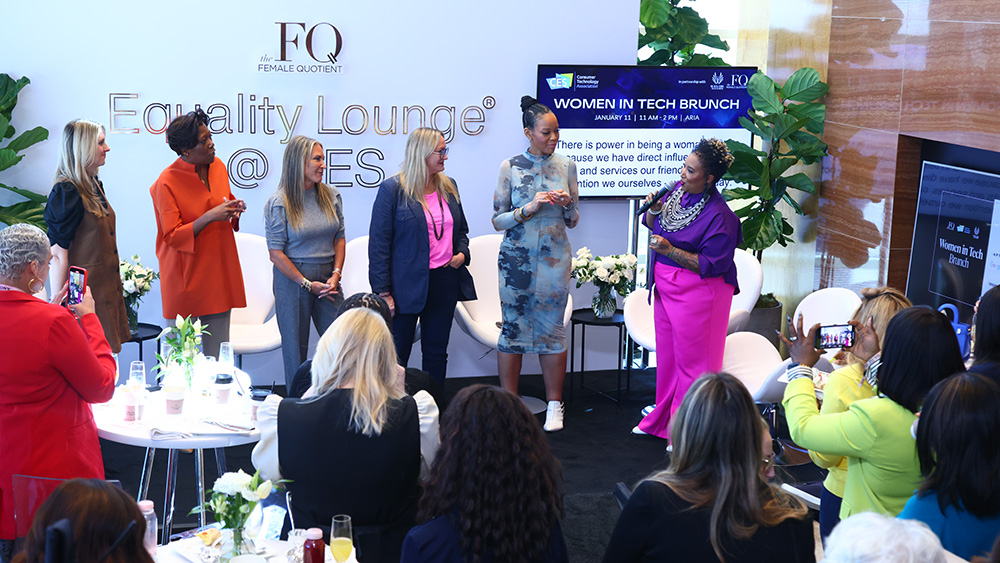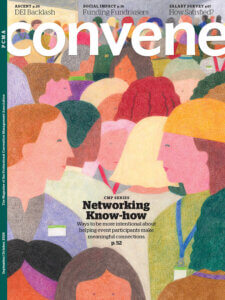
The Female Quotient’s Equality Lounges, like the one shown here at CES, are designed to be spaces where women can form connections and friendships within their industries, and also take in specialized programming. (Consumer Technology Association)
Women need a different kind of networking structure than men, according to J. Kelly Hoey, a networking expert and author of Build Your Dream Network: Forging Powerful Relationships in a Hyper-Connected World. The way successful men network, Hoey told Convene, “does not work for successful women.”
Women typically have narrow and deep networks while men have broad and shallow networks, she said. Both have strengths and weaknesses: “A broad, shallow network is great for finding and spreading big ideas and opportunities, while the strength of a narrow, deep network is having a tight-knit community of close friends and colleagues to rely on,” she said. The downside of only having the latter, she said, is that “it doesn’t have a lot of room to expand your wings.”
High-achieving women have both. In addition to having a trusted inner circle, “they know people across the industry, they have these acquaintance-level professional relationships that they can turn to or look to for insights,” Hoey said, adding that she has found this to be true based on research across myriad industries and countries.

Kelly Hoey
Yet roadblocks often seem to stand in the way of building those far-reaching networks. Women spend less time networking in the prime years of their career compared to men, according to Julia Boorstin’s book, When Women Lead. One reason why that may be is that the mid-career period is also the time when many women choose to start families, but studies show a significant drop-off in networking during this career phase for women who don’t have children as well.
Challenges Connecting at Events
It can be especially difficult for women to make meaningful connections when attending events in sectors that have a high density of men, like STEM. Researchers from the University of Minnesota performed a randomized field experiment at an IT conference where women had experienced significantly less success in networking than men, hypothesizing that two barriers were to blame: challenges locating and meeting new people, and social barriers that make interactions difficult.
The researchers designed and tested a solution where attendees received a nonreciprocal list of potential contacts and introductions made over e-mail. The result was a huge success: The number of new contacts women met increased by 57 percent, the time spent talking to those contacts jumped by 90 percent, and the number of LinkedIn connections they added went up by 29 percent. To boot, their odds of scoring a new job increased by a factor of 1.6 percent. Interestingly, those same interventions did not improve men’s outcomes in the study.
“There is something about traditional networking that simply has not worked for women,” Boorstin writes. “And women are trying to do something about it.”
Carolyn Childers and Lindsay Kaplan, founders of Chief, are two of them. The pair met, according to Boorstin’s book, after experiencing a frustrating networking event together and realizing they were both looking for the same thing: “a simple, structured solution to their networking challenges that would give them access to useful, like-minded professionals.”
They started Chief in 2019, with the hope that through high-level connections and coaching, more women could move into positions of power and influence. Today, with 20,000 members, Chief claims to be the largest network of senior women executives. The company hosts in-person and virtual gatherings as well as annual one-day summits in major U.S. cities, along with other community experiences and personalized career consultations.

The Women in Tech Brunch takes place annually at CES. (Consumer Technology Association)
Creating Opportunities
Research shows that women-only gatherings can level the playing field. In a study of 2,600 women who had attended an event organized by the Conferences for Women — whose mission is to promote, communicate, and amplify the influence of women in the workplace and beyond — they had triple the likelihood of receiving a pay increase of more than 10 percent in the year following the event, while 78 percent reported feeling “more optimistic about the future” and 71 percent said they “felt more connected to others.”
Women-only professional events “are definitely getting bigger billing,” Hoey said. “The need — and opportunity — has been there for years … and now women are unapologetic about seeking opportunities that fulfill or advance their business needs and in a format that fits their world view.”
The next best thing to a women-only event? Dedicating spaces and events for them within larger events. The Female Quotient (FQ) is an organization that brings its sassy style of pop-up Equality Lounges to traditionally male- dominated, high-profile events, like the World Economic Forum, Cannes Lions International Festival of Creativity, and CES.
FQ got its start when Shelley Zalis, now CEO, attended CES in 2013 and felt “tired of being an only and lonely,” so she invited other female attendees at the conference (an estimated 3 percent at the time) to walk the trade-show floor with her. Fifty women showed up, and a movement began. “The second I was surrounded by women just like me, talking about work-life balance and imposter syndrome, and we also all had the power of the purse — we all had money — we started doing deals with one another,” she told Event Marketer in 2023.
During a session at FQ’s Equality Lounge at Cannes Lions in 2023 published on YouTube, panelist Valerie Beauchamp, who has compared the networking habits of men and women in her role as LinkedIn’s vice president and global head of agency development and marketer education, said she has found one major differentiator. Men, Beauchamp said, are “unafraid to ask uncomfortable, specific questions — like ‘How much money do you make? I’m going for a new job and I need to figure out my market value,’ for example.”
Beyond Networking
Since Zalis first walked the floor 11 years ago, there are now several one-off events and spaces for women to connect at CES, which is owned and organized by the Consumer Technology Association (CTA), in addition to FQ’s Equality Lounge. That includes the Women of Inforum@CES CES networking reception, the WiCT Legacy Awards 2024 hosted by Women in Consumer Technology, CTA’s Women in Tech Brunch, and corporate partner functions, like Walmart’s Sistas in Sales x Walmart Connect Fireside Chat.
RELATED: Why Are These Women-Only Networking Spaces So Popular?
Earlier this year, CTA named its first female president in its nearly 100-year history, Kinsey Fabrizio. A 16-year veteran of the association who has previously served as senior vice president, CES and membership, Fabrizio has seen the evolution of CES firsthand. Fabrizio told Convene that while she feels “like there’s always more work to do,” she thinks “we’re doing a good job in seeing the increase of women at these events year over year.” Next year, for example, the Equality Lounge will move to a bigger space at CES due to high demand.
Fabrizio said that women attending CES are looking for more than just networking. She often sees them making connections during the show, then going on to set up one-on-one mentoring afterward. “As a woman who’s come up in the tech industry, mentoring has been something that I’ve gained so much value from,” she said. “Having one-on-one mentoring from other women has been really critical to my career growth and my path at CTA and CES.”
Jennifer N. Dienst is senior editor at Convene.

Read the Sept.-Oct. Convene issue as it appeared in print in our digital edition.
Earn CMP Credit
In the following stories from Convene’s September-October CMP Series, we share how event organizers are creating innovative and flexible spaces and formats that foster meaningful connections. You can earn one clock hour of CMP certification by visiting the CMP Series web page to answer questions about the networking articles below.
- Architects of Connection: Event Organizers Offer New Ways to Network
- Building Authentic Connections: The Human-Centric Vision of C2 Montréal
- Higher Ed, Advanced Networking
- Leaning Into Connections Is the Secret to This Event’s Success
- Designing ‘A Beautiful Nesting Ground’ for Deeper Relationships
- Event Attendees ‘Don’t Want to Waste Their Time Anymore’
The Certified Meeting Professional (CMP) is a registered trademark of the Events Industry Council.
